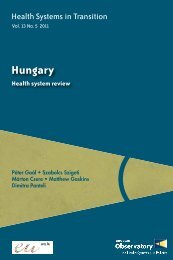Canada - World Health Organization Regional Office for Europe
Canada - World Health Organization Regional Office for Europe
Canada - World Health Organization Regional Office for Europe
Create successful ePaper yourself
Turn your PDF publications into a flip-book with our unique Google optimized e-Paper software.
58<br />
<strong>Health</strong> systems in transition <strong>Canada</strong><br />
Table 2.5<br />
Survey of sicker adults in terms of access, coordination and patient-centred<br />
experience, 2011 (% of patients)<br />
Same day or next<br />
day appointment<br />
Waited 6 days<br />
or more<br />
Access to doctor or nurse when sick or in need of care<br />
Difficulty getting<br />
after-hours care<br />
without going to ED<br />
Used emergency<br />
department in past<br />
2 years<br />
Waited less than<br />
1 month to see<br />
a specialist<br />
Experienced<br />
coordination gaps<br />
in past 2 years<br />
Experienced gaps in<br />
hospital or surgery<br />
discharge in past<br />
2 years<br />
Any medical,<br />
medication or<br />
laboratory errors<br />
in past 2 years<br />
Shared decisionmaking<br />
with<br />
specialist<br />
Australia 63 10 56 48 59 36 55 19 64<br />
<strong>Canada</strong> 51 23 63 58 52 40 50 21 61<br />
France 75 8 55 33 67 53 73 13 37<br />
Sweden 50 22 52 50 63 39 67 20 48<br />
United<br />
Kingdom<br />
United<br />
States<br />
79 2 21 40 80 20 26 8 79<br />
59 16 55 49 88 42 29 22 67<br />
Source: Derived from Schoen et al. (2011).<br />
Note: ED: Emergency department.<br />
Since 2008, some provincial ministries of health have launched patientcentred<br />
care initiatives. In Saskatchewan, <strong>for</strong> example, an externally appointed<br />
ministerial advisory committee, known as the Patient First Review, consulted<br />
patients and caregivers and reviewed existing care processes be<strong>for</strong>e making<br />
a series of recommendations <strong>for</strong> change (Dagnone, 2009). In Ontario, the<br />
provincial government passed a law entitled “Excellent Care <strong>for</strong> All” that<br />
requires hospitals to engage with their patients and caregivers in order to gauge<br />
the level of satisfaction with services, and requires health care organizations to<br />
develop a declaration of values based in public input.<br />
2.9.6 Patients and cross-border health<br />
Under the portability provision of the <strong>Canada</strong> <strong>Health</strong> Act, provincial and<br />
territorial governments are required to provide coverage <strong>for</strong> insured hospital and<br />
physician services <strong>for</strong> their residents when they are visiting other jurisdictions,<br />
both inside and outside <strong>Canada</strong>. Within <strong>Canada</strong>, section 11 of the Act requires<br />
that residents visiting other jurisdictions be reimbursed at the rate approved by<br />
the P/T plan in which the services are provided unless there is an agreement<br />
between the jurisdictions to do otherwise. Outside <strong>Canada</strong>, P/T plans are to<br />
reimburse the amount that would have been paid in the home province or<br />
territory.
















